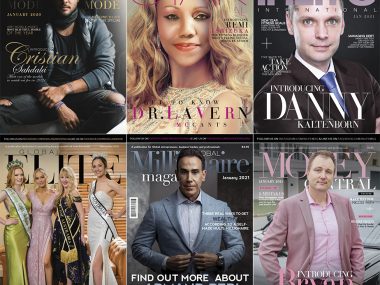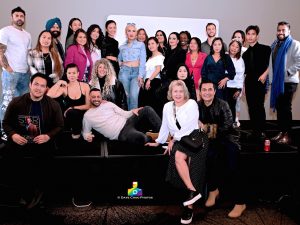Joeel and Natalie are co-founders of Transformation Academy; they train leading-edge entrepreneurs, leaders, and life coaches on how to master their mindset and create a purpose-driven business so they can monetize their passion and live life on their terms.
Joeel and Natalie have started more than a dozen businesses, including (in chronological order) imports, photography, non-profit teen center, life coaching, t-shirts, magazine, book publishing, professional speaking, conferences and workshops, holistic virtual office center, online directory, life coach training, and an online academy. Joeel is a former psychology professor with a Master’s Degree in Counseling and Education is currently completing his dissertation on eudaemonic happiness for his Ph.D. in Psychology.
In 2014, they pivoted their business online, first by transitioning their print magazine into digital format. Later, a long-term illness inspired them to convert their coaching and training programs into online courses. Since then, Transformation Academy has trained 700,000 coaches from 200+ countries and territories worldwide. They are advocates for the democratization of education, making real-world, transformational knowledge and tools accessible to all.
StarCentral Magazine recently caught up with Joeel and Natalie to discuss their journey as entrepreneurs and here’s what went down:
When did your entrepreneurial flair first reveal itself?
The spark of hustling started when we were kids for both of us. For me (Natalie), it first appeared when I was 11. Intrigued by the practice of selling personal items in your front yard at yard sales, I packed up my entire Barbie collection and set up at the corner of the street. Within 20 minutes, a woman had driven by, stopped, and bought the entire gaggle of dolls and accessories for $8. Being able to walk to the corner store and buy candy with my own money was enough to plant the seed of entrepreneurship for a lifetime.
For Joeel, growing up with a mom who always had a side hustle and a dad who did land development allowed him to experience entrepreneurship firsthand. He helped stock Ilves at his mom’s health food store and attended business meetings with his dad. In middle school, his first independent venture was selling chocolate bars door-to-door.
How did your life look like before being an entrepreneur?
Despite our early dabbling with making our own money, we both started out on traditional employment paths in early adulthood. I started out in marketing as a graphic designer. However, by 24, I knew the constraints of living in a box for 9 hours every day would suffocate me, so I quit and started freelancing. Joeel worked in social services while he went to graduate school. He worked as a child protective investigator, supervisor for VPK in his county, a counselor for migrant families, and later as a psychology instructor. He almost always had a side hustle, including selling wholesale sandals or doing photography. When he started offering workshops based on the projects he was completing for his master’s degree, something started to click. Speaking and teaching were something he could do independently. A couple of years after we met and started working on a speaking and coaching business together, Joeel left employment for good, too.
As an entrepreneur, what is it that motivates and drives you?
While most people think of being self-employed as risky, we both see employment as riskier. There is no such thing as job security, and having our entire livelihood in the hands of an employer who can change or eliminate our job at any time always felt like a looming threat. Having the ability to take responsibility for our own financial lives by creating our own income has always felt like a less risky approach to making a living. Of course, it has its risk, but the most important factor for us is that we are the ones who hold the power over our lives.
More importantly, we believe the biggest risk of all is living life spending most of your day doing something you hate and/or missing out on the things you really want to experience because you’re trapped behind a desk every day, on someone else’ terms. We both have an unusual drive to live life to the fullest, and we simply cannot do that without the autonomy, and freedom entrepreneurship brings.
So, our motivation comes from our drive to make entrepreneurship work. And because of this willingness to continue to try, no matter how many times we failed, we’ve been tremendously successful.
In one word, describe your life as an entrepreneur and explain why.
Empowerment. We believe entrepreneurship is the ultimate empowerment because once your money and time are within your control, the entire world of possibilities is open to you.
What were your top three motivations for starting your business?
Our first motivation to be entrepreneurs, in general, was to be independent.
Our motivation to start our coaching and speaking business was to have a purpose-driven business doing what we love most.
Our motivation to start our existing business (online education) was to create passive income and the resulting location independence and financial freedom.
What would you say are the key elements for starting and running a successful business?
The key element for starting a business is to be an anti-perfectionist. Do not wait until you have everything figured out. Do not wait until you have the perfect equipment or all of the things. Start with the smallest viable product. Just put it out there. Experiment. Try and fail. Repeat. It’s never going to be perfect. It doesn’t have to be perfect. Being perfect will hold you back from starting. Just start.
The key element for running a business is processification. (Yes, we made up that word.) In most businesses, the entrepreneur starts out wearing all of the hats. But, to run a business, you will need to outsource some of the responsibilities over time. In order to do this, you have to get “how” you do what you do out of your head and onto paper. Track the processes for everything you do. Write it down. Create a manual for yourself. Then, whenever it’s time to give another responsibility away to someone who can help you, you already know what you need them to do and train them with your manual. If you hold onto control of everything, you can only grow as far as you can handle the workload (which isn’t very far).
The key element for making a business successful? Continuing to learn, try, fail, pivot, repeat, forever, no matter what.
What are the three biggest challenges you have faced growing the business and how did you overcome them?
1) While our business has focused generally on personal development education all along, it has taken many forms, including coaching, speaking, events, teaching, publishing, and even a physical center. While it was great that we were willing to grow and expand and try new things, one of the challenges we faced was knowing when to let something go. We didn’t. We held onto our business segments until long after they were serving our company or us. Usually, this happens not just because of our strong sense of commitment but also because of our duty. We really hate having to let people down.
We closed the print version of our magazine only after paying out of pocket for several months. We knew people loved it, and our advertisers depended on it. But when we finally released it, there was liberation in being free. And as soon as we cleared the time and mental space it had been occupied, new, better opportunities appeared. We’ve had to face this decision point many times, and each time it is hard. But we have learned how to let go lovingly.
2) Our greatest challenge happened in 2014. We had five businesses operating simultaneously, and while we had a small number of helpers, the vast majority of the responsibility landed on us as the business operators. Joeel became incapacitated from illness, and I had to be his caretaker. After several months, when the sickness continued and continued, our businesses started crumbling around us. We could no longer coach our clients, do our events, keep on top of our projects. The only thing we could manage to keep going was our digital magazine, which made subscription income that didn’t take a lot of our time. We also had a few online courses we had created that were paying a small residual income every month.
The illness lingered for over a year. By that time, all of our other business segments had screeched to a halt. But, from our limited circumstances and with Joeel’s limited energy, we found a way to turn it around. We learned the lesson that the magazine and courses had taught us: this semi-passive income was a life-saver.
We decided we never wanted to be in this position again, trading our time for money and having our entire operation dependent on our direct operation. We began studying the online course industry obsessively. We started recording courses based on the workshops and coaching programs we previously covered in person. We were inspired when we started hearing from students worldwide who were benefiting from our material. We kept going, and we created more than 20 courses over the next year. Not only did we find hope again, Joeel rebuilt his strength, and we rebuilt a business sharing what we love in a way that creates semi-passive income.
3) The third challenge we have faced is specifically related to the process of growth. In the last question, we addressed how important it is to processify because it’s impossible to outsource unless you know what you need help with and how to teach someone to do it. We learned this lesson the hard way, which is why we’re so passionate about sharing it.
We used to hold ourselves back from growing because we feared adding more to our already overflowing plates. We feared nobody else could replace us or do what we do, or at least they couldn’t do it as well as we do. But, the truth is that even if someone could have done it better, we honestly didn’t know HOW to have them take over the workload. We didn’t know our processes. We had done such a good job just accomplishing more than seems humanly possible with sheer grit.
But, eventually, our drive for growth overpowered our resistance to more work. We started growing far beyond our capability of handling it ourselves. We knew we had to hire help, so we had to start tracking every step we took for every task and responsibility. It felt overwhelming at first, but when we hired our first full-time employee, not only did it free so much time every day, it freed us from that fear that we couldn’t handle our own growth. We did it again with a new employee and then again and again.
Over several years, we outsourced nearly all of the day-to-day operations of our business. We are finally free to focus on what we do best, create new opportunities, make powerful connections, be the face of the organization, and share what we love to teach.
What form of marketing has worked well for your business throughout the years?
There is one strategy that has hands-down worked more than any other strategy: collaborating with people, places, or businesses who already have access to our ideal clients.
When we had zero coaching clients, we networked through online forums and in-person events where people hung out who were interested in the type of transformation we offered through our coaching. We schmoozed and honed our elevator pitch and got clients.
We had no advertisers and no readers when we started our print magazine. In fact, we didn’t even have a magazine. We contacted 600 businesses in the area through email and door-to-door. But what unlocked the magic was making a connection to a single advertiser that didn’t just tell us “yes”; they told us “we’ve been waiting for you!” This advertiser was a well-known Unity church. All of the relevant businesses in the area, from alternative health practitioners to health food stores to other spiritual centers, knew and respected this church. When we approached them with the endorsement of Unity, we got yes after yes. We printed our first magazine without paying a dime out of our own pocket because the community purchased ads based only on the idea of a magazine that didn’t yet exist and the endorsement of a single, trusted community leader.
When we held conferences, rather than paying to advertise the event, we invited speakers to participate who had a local following. They announced their participation and invited their followers to attend. We filled the seats without a dollar spent.
When we started selling online courses, we sold them through online course marketplaces. These websites were the perfect example of what we’re trying to convey here. The websites spent millions of dollars advertising online to get people who were interested in learning to purchase online courses. The millions of students they had were our ideal customers because they were already pre-screened as being the lifelong-learning type, they were already accustomed to taking online courses, and best of all it was 100% free to reach them.
As you grew the business, what have been some of the most important leadership lessons you have learned?
As business owners, we have learned that one must learn to be a good leader both internally and externally.
Internal leadership is the ability to empower and support all of those who support you. Not only have we learned how to train our staff members to take on responsibilities that help our business run more efficiently, but we’ve learned that this is a continuous, ongoing process. They don’t work for us; we work for them, meaning it is up to us to ensure they have everything they need to do their job well, including the training, information, tools, and autonomy.
External leadership is more about how we present ourselves and how up in the marketplace as a leader in personal development, coaching, and entrepreneurship. Technology, especially social media, has changed drastically since we first began over a decade ago, so we have had to learn how to be more of a “public figure” over the years. We’ve had to learn about branding and try new avenues for connecting, like podcasting. We’ve had to learn how to be “social” on social media. We’re still learning. While there are too many factors to get into here, the one thing we have learned is essential no matter how or where we are representing our business or brand, we need to own our message. We need to be willing to share what we really believe and not waiver because not everyone is going to like it. In a cultural climate that is sensitive and touchy about so many things these days, this is hard. But the number one factor to being a good leader is integrity.
What is the best advice you have ever been given?
Stop giving away your business and selling your charity. (Read that again.)
What advice would you give to a newbie Entrepreneur setting up their first business?
Make sure you’re clear on your WHY. Not just your why for this particular business, but your why for being self-employed. If you don’t have a big enough reason, you are likely to struggle with follow-through. Ask yourself, why is being an entrepreneur a MUST for me?













